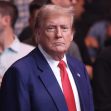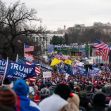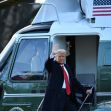In a statement of just 216 words, the Supreme Court of the United States, in an 8-to-1 decision, denied former President Trump’s request to block the release of National Archive documents to the House Select Committee to Investigate the January 6th Attack on the United States Capital.
In an unsigned opinion, the high court rejected Trump’s application for a stay of mandate and an injunction pending review on January 19. Trump had asked the justices to block the December 9 decision of the Court of Appeals for the District of Columbia from going into effect. Trump’s application claimed executive privilege and said that handing over his documents would “fundamentally affect the functioning of the American presidency.”
The case began in August when the House Select Committee asked the National Archives for presidential records related to the January 6 events. They asked for “all documents and communications related to efforts, plans or proposals to contest the 2020 presidential elections results. They also requested “videos, photographs and other media” from the White House that related to “the march to the Capitol…and the activities of President Trump and other high-level executive branch officials that day.”
Five days after the request was made, an archivist notified Trump that he would soon give the documents to the Committee. The former president quickly asserted executive privilege.”
But President Biden told the archivist that he had “determined that an assertion of executive privilege is not in the best interests of the United States and therefore is not justified.” He stressed that executive privilege “should not be used to shield from Congress or the public information that reflects a clear and apparent effort to subvert the Constitution itself.” Solicitor General Elizabeth Prelogar told the court that “The president, rather than the former president, is best positioned to make those assessments.” The Court of Appeals agreed, then said there was “no reason to override President Biden’s judgment.
Trump sought to protect over 750 pages of documents covered in his lawsuit against the Select Committee. A filing from the National Archives explained that the documents included “presidential diaries, visitor logs, handwritten notes from then-White House chief of staff Mark Meadows, a binder from then-White House press secretary Kayleigh McEnany, and a draft executive order on election integrity.”
The Supreme Court agreed with the conclusions of both the district court and the court of appeals that said the materials must be turned over. The Supreme Court wrote, “Trump’s claims would have failed even if he were the incumbent” and wrote that Trump’s status as a former President “made no difference to the court’s decision.” The Supreme Court’s opinion explained that because of the appeals court’s reasoning, it had “no need (to) conclusively resolve whether and to what extent a court may “second guess the sitting President’s decision to release privileged information.” At the end of its brief opinion, the Court said, “Any discussion of the Court of Appeals concerning President’s Trump’s status as a former President must therefore be regarded as nonbinding dicta.”
While only Justice Clarence Thomas dissented, a concurrence by Justice Brent Kavanaugh weighed in on the issue of privilege. He said that although the Court said the appellate court’s discussion about privilege was “nonbinding dicta,” he still “respectively disagreed with its reasoning.” He said that a “former President must be able to successfully invoke…privilege…for those communications that are “fundamental to the operation of Government.” He supported his position by saying “the executive privilege for Presidential communications is rooted in Article II of the Constitution” and “public dissemination… may well temper candor with a concern for appearances and...to the detriment of the decision-making process.
NPR reports that the Committee has recently requested phone records from Eric Trump and Kimberly Guilfoyle, who is engaged to Donald Trump, Jr. Several commentators believe the Supreme Court opinion will be useful precedent as the House Committee pursues additional documentary evidence of events related to January 6. Ivanka Trump has also been requested to testify.
Subpoenas and requests are escalating. But recipients so far are trying to avoid them. Meadows, for example, has already filed a lawsuit seeking to quash subpoenas he has received from the House Select Committee. His lawsuit cited Trump’s executive privilege, which was denied by the Court of Appeals but termed “nonbinding dicta” in the Supreme Court decision.
Many politicians and legal analysts were quick to comment on the Supreme Court’s denial of Trump’s request to block release. House Committee Chair Bennie Thomson (D-Miss) and Vice-Chair Liz Cheney (R-Wyo) said in a statement, “The Select Committee has already begun to receive records that the former President had hoped to keep hidden and we look forward to additional productions regarding this important information.”
House Speaker Nancy Pelosi (D-Calif) said “Reviewing documents that former President Trump sought to hide from the American people is essential to understanding the events leading up to and during the deadly insurrection and its aftermath, and to ensuring it never happens again.”
SCOTUSBlog called the ruling, “a major victory for the congressional committee. It said the ruling “clears the way for the National Archives to turn over several hundreds of documents to the committee immediately.”
NPR said the Supreme Court “has delivered a blow to former President Donald Trump” and said the court’s order “paves the way for release of records…that could shed light on the events that led to the riot by Trump supporters protesting the results of the 2020 presidential election.” Most commentators see the Supreme Court decision as a critical stepping stone toward discovering the truth.






